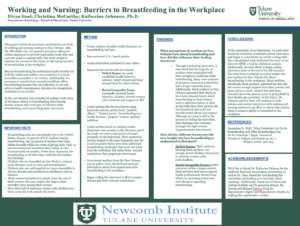By: Christina McCarthy
Hi everyone! It’s so nice to be back at Tulane after spending four months studying abroad in Madrid, Spain. This past summer I worked as a Reproductive Rights Intern with Dr. Katherine Johnson on her Working and Nursing research project, which aimed to understand the challenges working mothers face while breastfeeding their baby. On January 23rd, another fellow intern and I presented our findings at the Conceiving Equity Poster Presentation, where we were ab
le to converse with faculty, students, and researchers on ways we can urge healthcare providers to better educate their patients on the benefits of breastfeeding.
This semester I will continue to with Dr. Katherine Johnson in the Department of Sociology on her new research project that examines how different states classify parentage regarding gestational surrogates and egg donors under legal statutes. So far, I have learned how to use certain law databases like Nexis Uni to search for specific statutes related to egg donation and gestational surrogacy. I have read policies implemented in Alabama, Arizona, Arkansas, Alaska, and Colorado and found that some states follow the Uniform Parentage Act, which was adopted by all states in 1973 and establishes paternity for children of married and unmarried couples, while others do not. However, now with the increase in reproductive technologies such as artificial insemination, the definition of a legal mother has become somewhat blurred. While navigating law databases, I have found that some states like Arizona, for example, strictly consider the biological mother the legal mother, regardless of whether or not they will care for the child after birth. I am eager to see where the rest of my research will lead me!
Since I had no prior experience reading legal statues, I have enjoyed learning more about how the legal processes in our country work and how a proposed state law first passes as a House Bill, then later a Senate Bill until they are signed by the governor and chaptered as a legal statute. I also am learning more about reproductive processes such as gestational surrogacy, egg donation, and artificial insemination. After working on two projects related to reproductive sociology, I have started to think about pursuing careers related to maternal/child health and even writing an Honor’s Thesis in this field of study!

